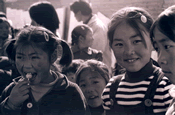The Western China Agro-Ecological Village (WCAEV) Development Project:
- Dingxi County, Gansu Province - 325 households (1470 people) in 4 villages Zhangjiachuan, Fengjiacha, Chankou, and Beichuan in the Fuxing watershed; Annual precipitation 352mm; Annual farm income $254 US/person.
- Zhunger County, Inner Mongolia Autonomous Region - 230 households (830) from 4 villages Sujiata, Nalingo, Bainilaing and Oboyen in Deshengxi watershed on the Erdos plateau region that surrounds the Gobi desert; Annual precipitation 350mm; Annual farm income $194 US/person.
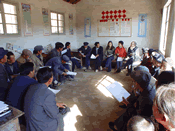 |
| Training session with local farmers in Gansu Province,
China |
The aim of the project was the holistic development of these two communities in western China using participatory approaches to introduce sustainable agricultural systems and community capacity building to overcome poverty and environmental degradation. This was achieved through the introduction of a farmer-to-farmer education and training program, improving local communication and resource networks and the establishment of farmer field testing and trial sites demonstrating appropriate technologies and seed varieties.
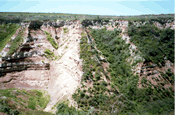 |
| Seabuckthorn is used as a soil stabilizer to help
control erosion on China 's steep slopes. More information can be
found at http://www.icrts.org/. |
The partnership improved the communication and support and technology sharing between China and Canada, as well as increasing the self reliance of marginalized Chinese farmers living in environmentally sensitive areas, while at the same time reclaiming degraded and vulnerable environments.
Over its 3 years of implementation (2002-2005), the WCAEV aimed to achieve the following:
- Increased capacity of farmers through the establishment of a farmer training network
- Increased household income by 20%
- Improved status and quality of life of women in rural communities
- Women involved in 20% of project community activities
- Improved quality of life (housing, education, health)
- Improved environmental conditions and a 33% reduction in areas vulnerable to soil loss through landscaper restoration activities including contour farming, revegetation of sloping lands and controlled grazing
Both communities showed dramatic developments in increased financial independence, food and income security and subsequent higher quality of life during the project, including:
- A 44% increase in mean household income in Dingxi and 60% in Zhunger
- Total revenue from farm-based sources (crops, livestock and forestry) increased by 64% in Dingxi and 68% in Zhunger
- Average income increased for women (Dingxi: 46%; Zhunger 24%)
- The number of households with a yearly deficit passed from 50% to zero in Dingxi, and decreased from 457% to 15% in Zhunger
The WCAEV program resulted in the following additional achievements:
- 21 farmer trainers trained in ecological farming systems (26% women)
- Over 4586 individual training days conducted in the beneficiary communities (with an average of 44% of female participants) through local farmer-to-farmer training networks
- 97% of villagers in Dingxi and 68% of villagers in Zhunger attending trainings
- Ecological practices adopted to support soil development and farm sustainability included: diversified cropping and increased crop varieties, composting crop residues, leaving residues in fields, green manures/cover cropping, reduced tillage, reduced animal grazing, use of check dams for water erosion control, planting trees on sloped lands, reduced use of chemical fertilizers, and reduced herbicide and insecticide use
- 103 and 56 varieties of crops, forages and vegetables distributed in Dingxi and Zhunger, respectively, including: potatoes, peas, lentils, flax, wheat, alfalfa, and millet
- 327 farm plans drawn up
- Improved male goats were introduced to the communities which had 343 offspring in the beneficiary villages in the first year and are still being bred today
- The establishment of farmers associations in each community, namely the "Dingxi Agricultural Technical Association" and the "Zhunger Growers Association" which are responsible for ongoing testing, extension and management of crop, vegetable and fodder varieties as well as trainings and livestock breeding programs
- Female farmer (Gao Cunying) was invited to speak in Beijing at high level Round Table meeting on Sustainable Soil Conservation According to the final evaluation by Chinese Ministry of Water Resources, the soil erosion rate was reduced by 35% in Dingxi and 65% in Zhunger during the lifetime of the project
Agro-Ecological Villages have shown to hold a promising future for rural development in China. Using ecological soil fertility development, farm planning, training and adapted seeds, they are a low cost, participatory development approach that may be the best way to uplift the millions of rural peasants in China.
 |
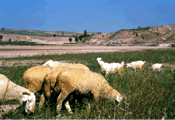 |
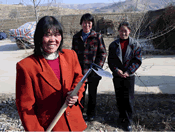 |
| Farmer evaluating improved variety of millet for food production |
Severe soil erosion in China in the hills is a direct result of livestock grazing on fragile lands |
Women in Gansu Province examining improved potato hoe that reduces labour requirements |
To learn more about REAP's programming in China, refer to the documents in our
on-line library.


